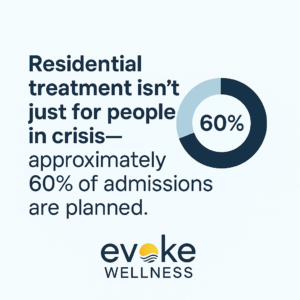When life feels heavy—but not catastrophic—it’s easy to talk yourself out of asking for help. Especially when you’re functioning on the outside: going to work, keeping up with responsibilities, even smiling when you need to.
But underneath? You might feel like you’re unraveling slowly, like your coping tools aren’t working the way they used to.
And still, the voice in your head says: “You’re not sick enough for that.”
That voice isn’t just your inner critic—it’s shaped by decades of stigma and misunderstanding around what mental health treatment really looks like.
Especially residential care.
Let’s debunk some of the most common myths that keep people from seeking residential treatment for mental health—and explore why this level of care could be a powerful, proactive step toward stability.
Myth #1: “Residential treatment is only for people in crisis.”
Truth: Residential care can be preventative, stabilizing, and clarifying.
Yes, some people enter residential treatment during acute episodes of depression, anxiety, or mood instability. But many others choose this setting before they reach that point.
Residential programs aren’t just for when things fall apart—they’re also for when you recognize that things don’t feel right and you want to course-correct.
Whether you’re burned out, emotionally shut down, or cycling through patterns that outpatient therapy hasn’t helped resolve, stepping into a residential environment gives you space. Space to regroup, reset, and reorient your life with expert support.
Myth #2: “If I go into residential care, it means I failed.”
Truth: Seeking treatment is a strong and self-aware choice.
There’s a quiet, persistent belief that if you need more support, something is wrong with you. That “strong” people can just keep pushing through.
But needing support doesn’t mean you’re weak—it means you’re human.
Residential care isn’t a punishment for not being able to “handle it.” It’s an intentional choice to give your mental health the same respect and urgency you’d give your physical health if something felt off.
Myth #3: “It’ll feel like being in a hospital.”
Truth: Residential settings today are designed for healing, not survival.
You might imagine locked doors, harsh lighting, cold rooms, and detached staff.
That’s not what modern residential mental health treatment looks like.
Programs today often emphasize comfort, community, and calm. You’ll find quiet spaces for reflection, warm meals shared with others who understand what you’re going through, daily therapy sessions, and downtime to rest and reconnect.
The environment is structured—but never sterile. It’s designed to help you breathe easier, not brace for impact.
Myth #4: “I’m not sick enough to need that level of care.”
Truth: Mental health doesn’t operate on a pass/fail system.
You don’t have to hit some invisible benchmark of suffering to qualify for help. If your day-to-day feels harder than it used to, if you’ve plateaued in therapy, or if you just need time away from your regular stressors to focus on healing—that’s enough.
Residential care exists because some healing requires immersion. It gives you time to identify what’s not working, learn new tools, and experience what it’s like to feel safe and regulated for more than an hour at a time.
And that doesn’t mean you’re “sicker” than anyone else. It means you’re ready for deeper support.
Myth #5: “Once I go in, I’m stuck there.”
Truth: You’re not locked in. You’re supported through every phase of the process.
This is one of the most persistent fears people have—and it’s understandable. Giving up some control can feel risky when you’re already emotionally vulnerable.
But residential care isn’t about taking power away from you. In fact, good programs work in collaboration with you. You’ll help shape your care plan, set goals, and stay informed about what happens next.
The average residential stay is measured in weeks—not months—and includes planning for what comes after, whether that’s stepping down to outpatient care or returning to work with new support systems in place.
Who Benefits from Residential Treatment?
Residential care can be life-changing for people who:
-
Feel emotionally stuck, even with therapy or medication
-
Are experiencing burnout, anxiety, or depression that’s affecting their functioning
-
Need structured support to stabilize mood or behavior patterns
-
Want to avoid a deeper crisis by addressing concerns now
-
Are navigating complex life transitions or past trauma
This level of care isn’t “too much.” It’s exactly the right amount when your emotional and mental load feels like too much to carry alone.
FAQ: Residential Treatment for Mental Health
How long does residential treatment usually last?
Programs can range from a couple of weeks to a few months, depending on your needs and progress. Your treatment team will work with you to determine the best timeline.
Will I be able to talk to family or friends while I’m in treatment?
Yes. Most programs include designated time for communication with loved ones and may offer family therapy sessions to support broader healing.
Do I need a diagnosis to be admitted?
Not necessarily. While an assessment will help guide your treatment, many people enter residential care without a formal diagnosis—they simply know they need more support than they’re currently getting.
What happens after I leave?
Residential treatment includes discharge planning to ensure you have a clear path forward. This might involve outpatient therapy, support groups, or continued medication management depending on your unique situation.
Does insurance cover residential mental health care?
Coverage varies by plan, but many insurance providers do cover residential treatment when it’s deemed medically necessary. Our team can help verify benefits and walk you through the process.
You Deserve More Than Survival Mode
If your mental health has felt like a balancing act—barely holding it together, pushing through, waiting for a breaking point—it doesn’t have to be that way.
You don’t need to prove you’re sick “enough” to seek care. You just need to want something better than where you are now.
Explore our residential treatment program in Massachusetts to learn what’s possible when you give yourself time, space, and compassionate support.
Ready to take a real step toward feeling better? Call us at (866) 931-6429. Our team is here to help you feel safe, supported, and steady again—no crisis required.





